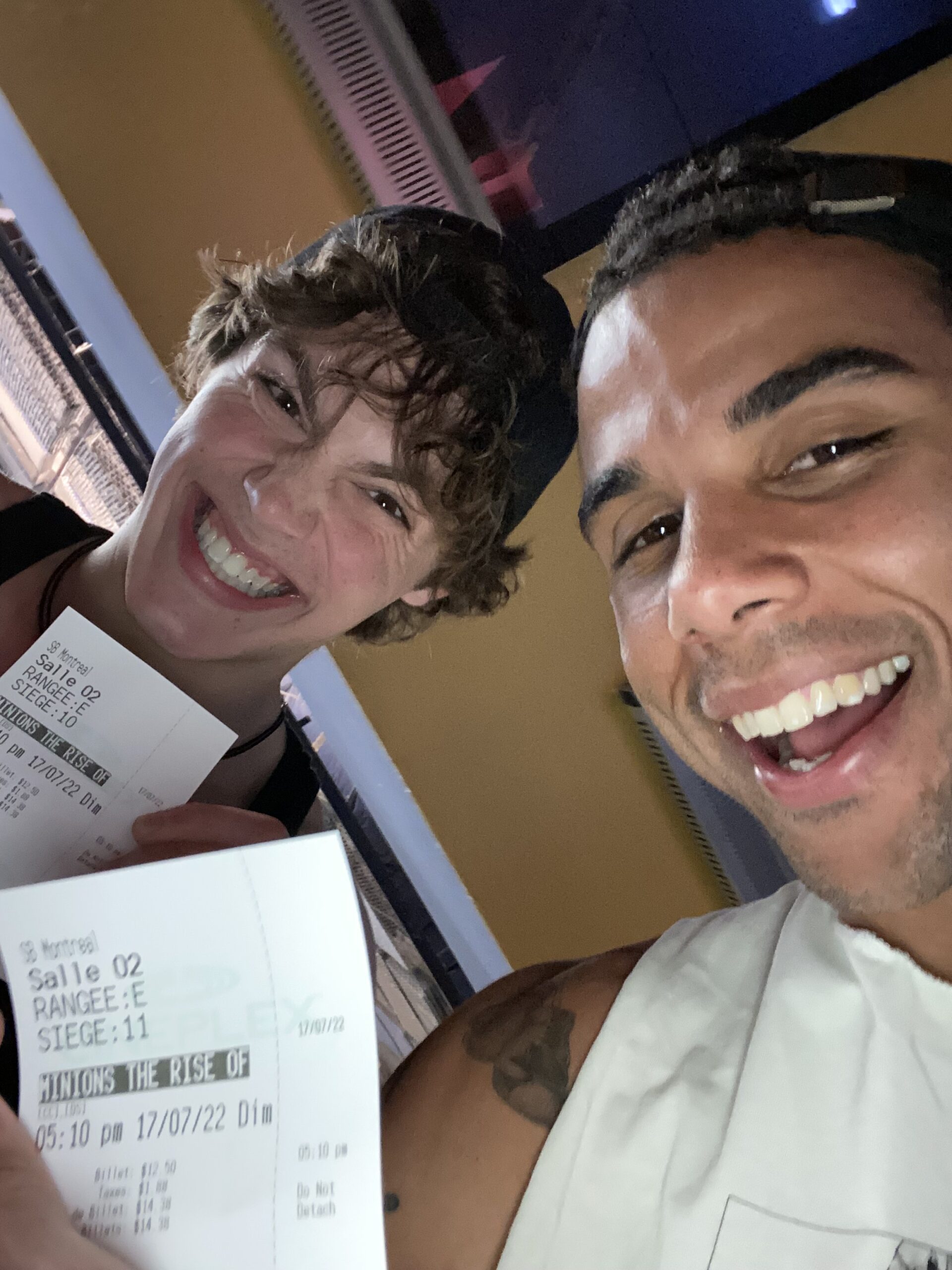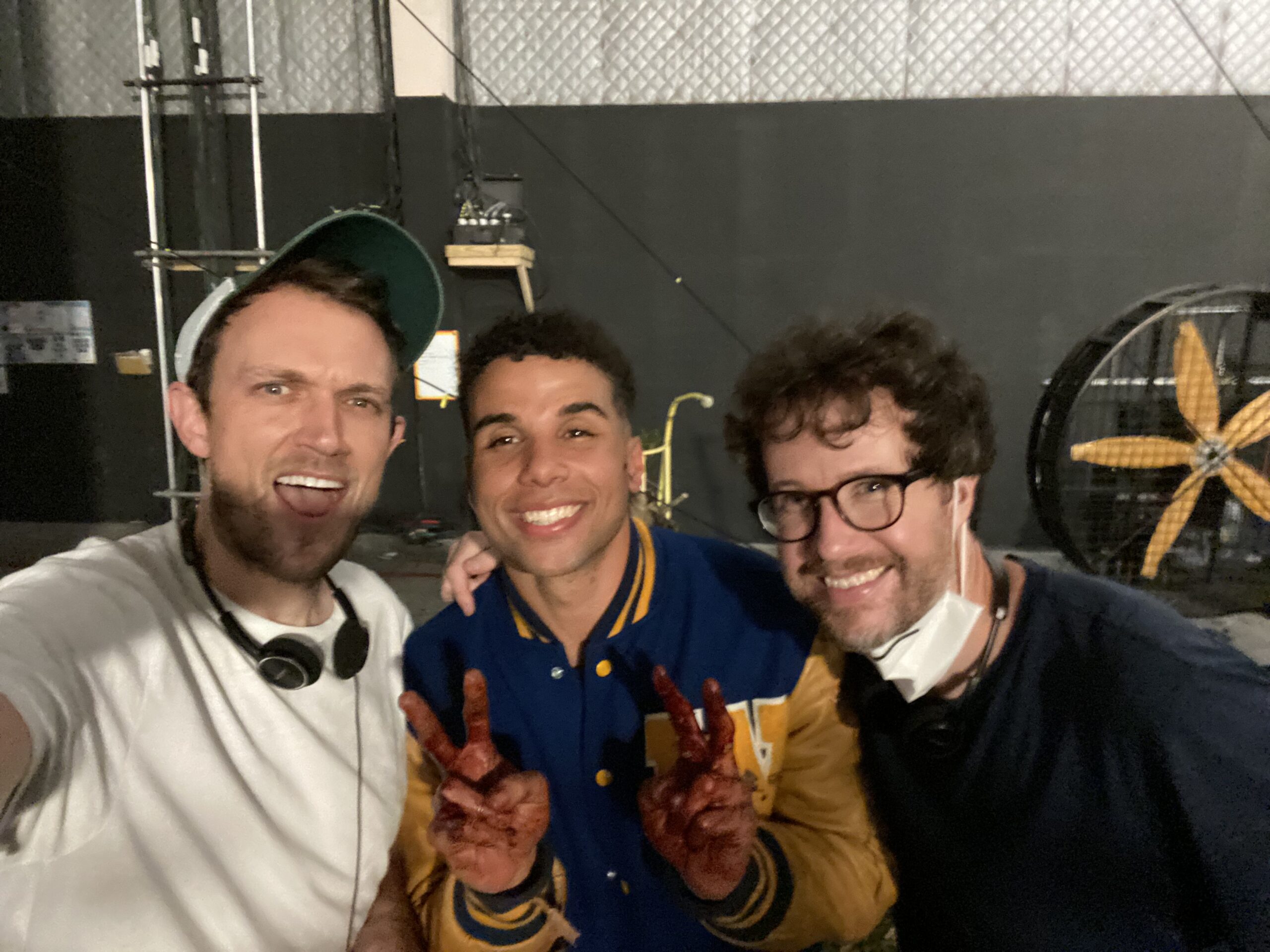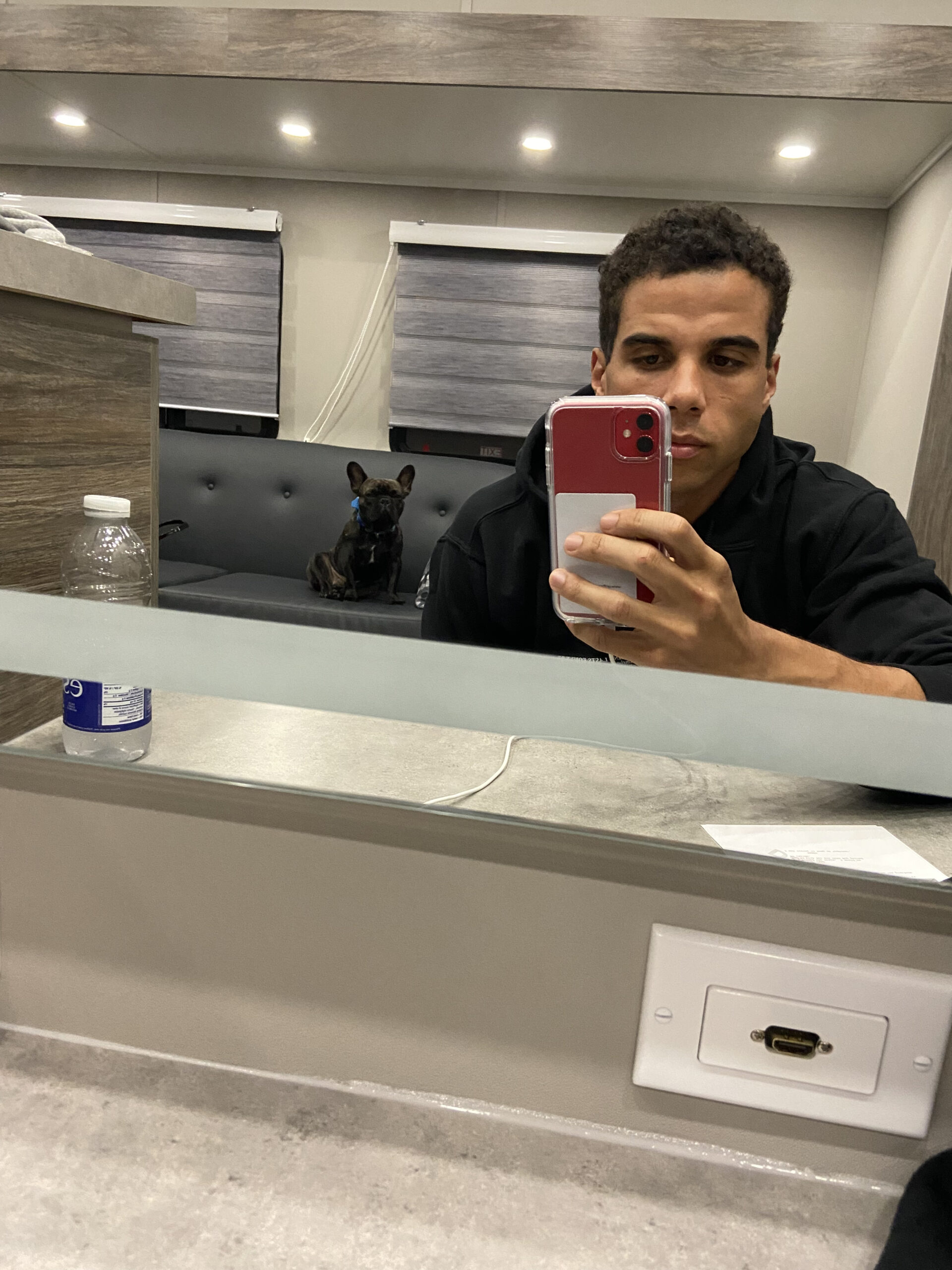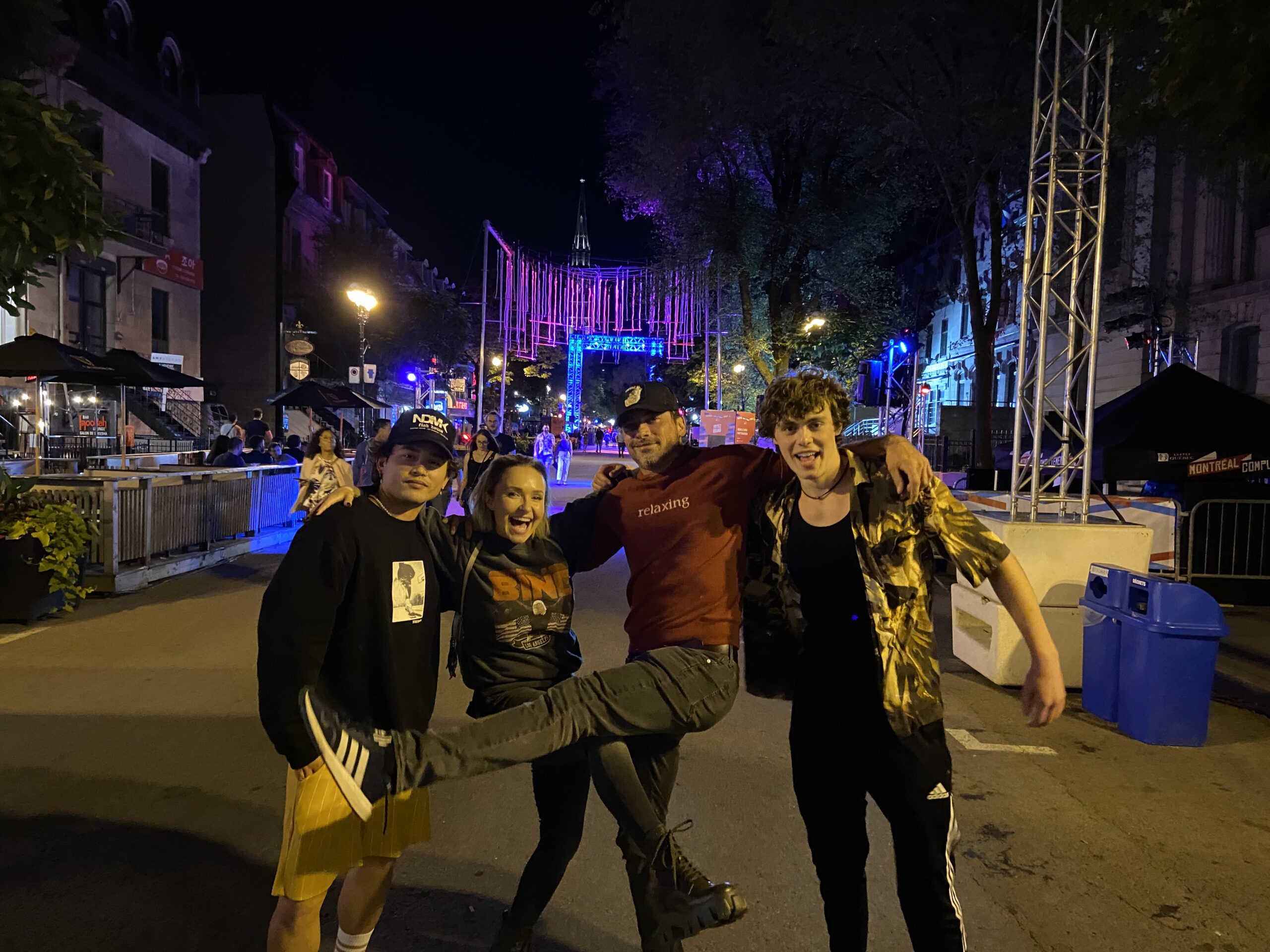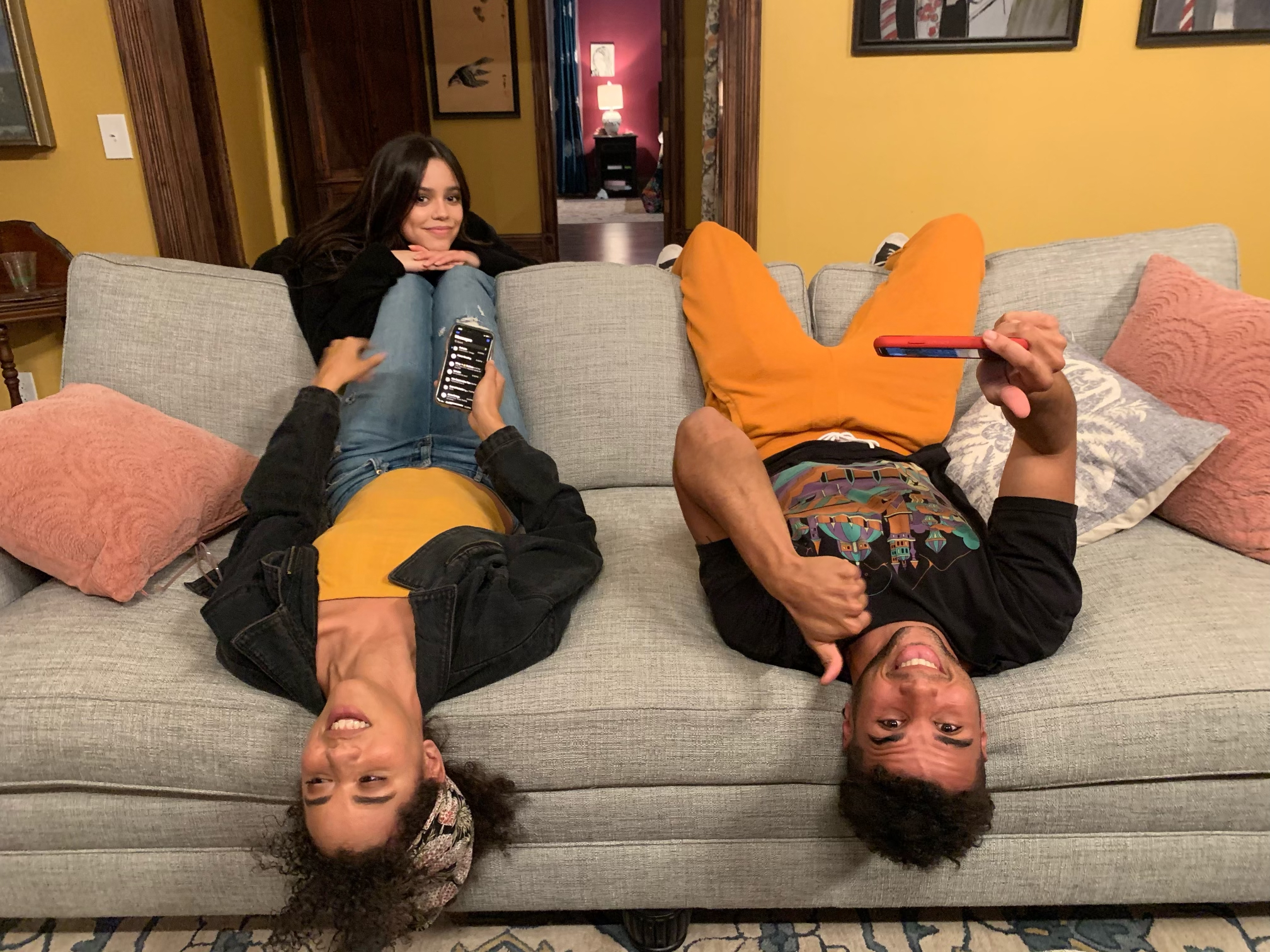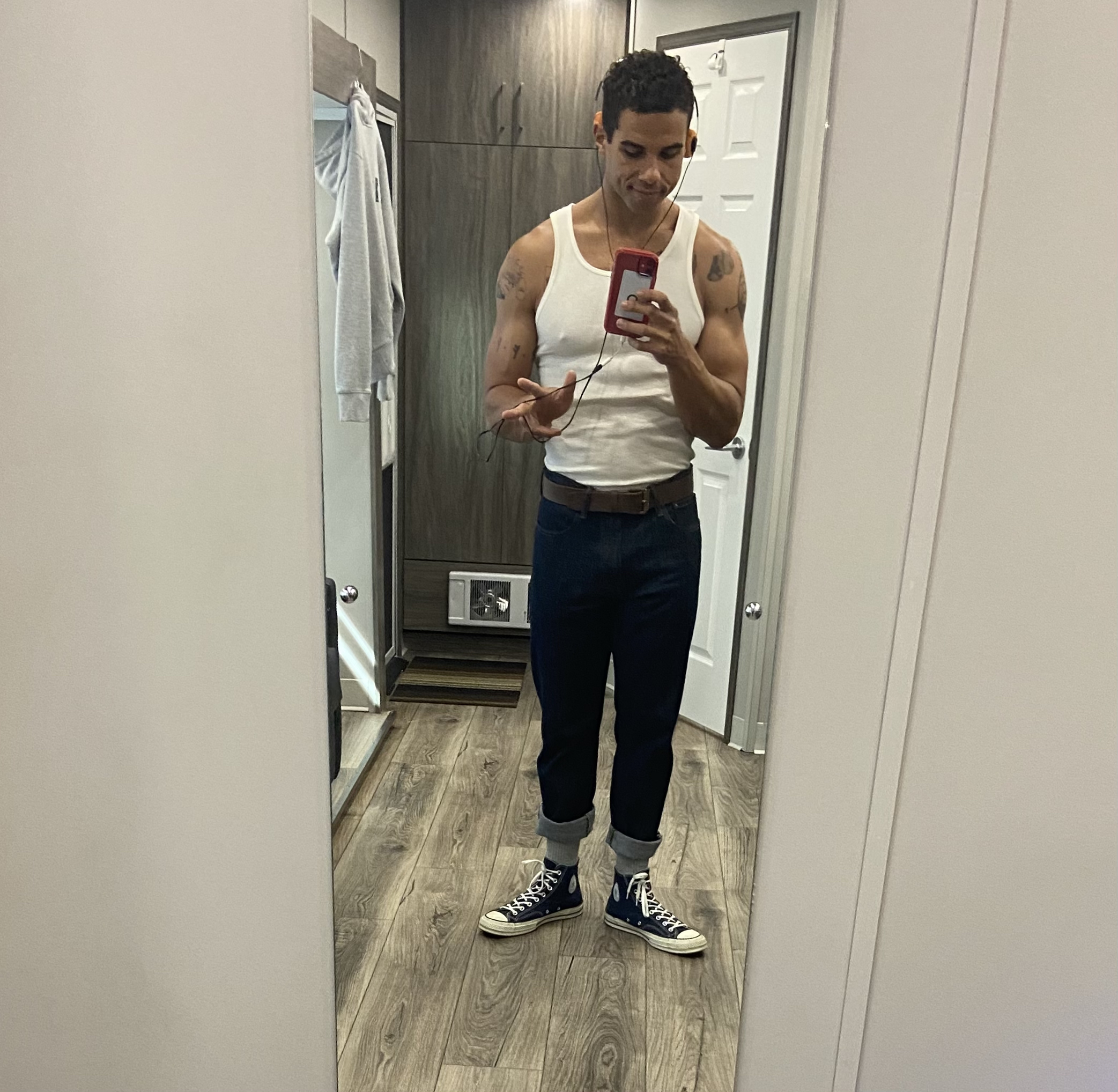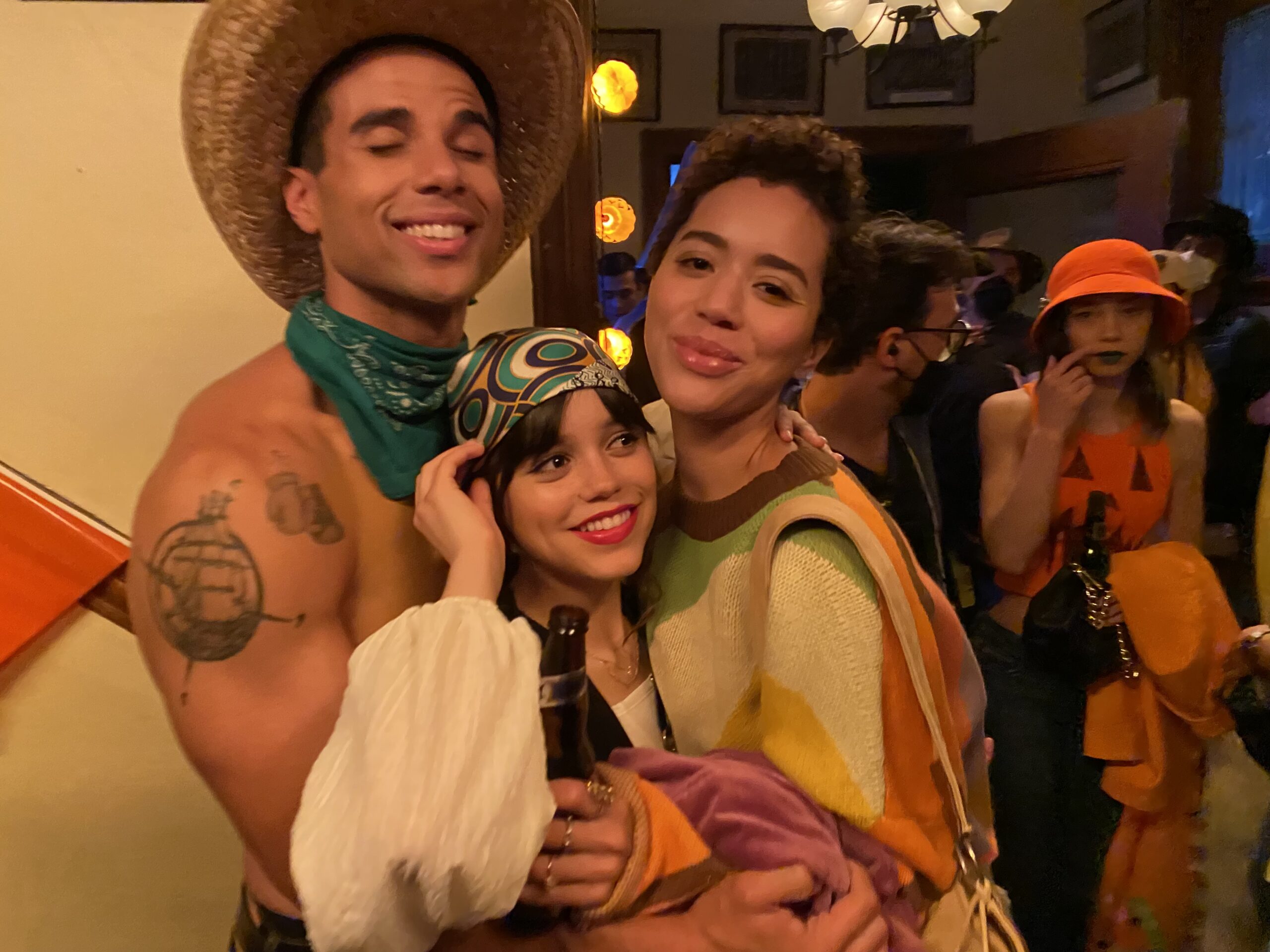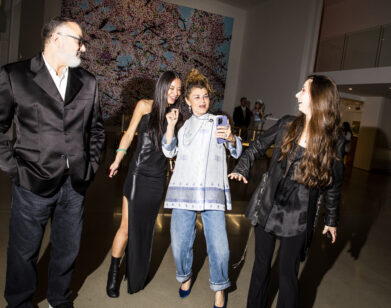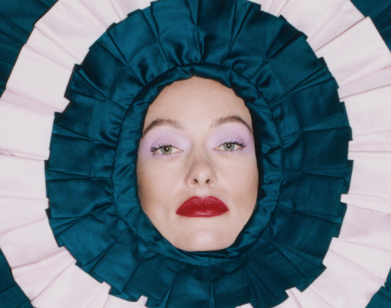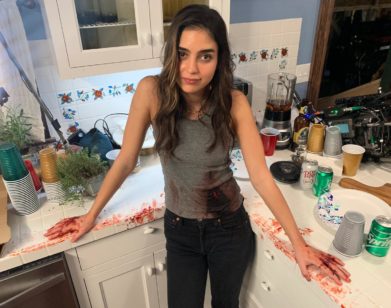BTS
Mason Gooding Takes Beanie Feldstein Behind the Scenes of Scream VI
The hordes of Scream devotees and new fans alike who packed into theaters this past weekend for the release of the cult horror franchise’s sixth installment were never meant to see Mason Gooding’s face on the big screen. After all, his character Chad, a “less intelligent, less horror savvy, arguably less attractive brother” to final girl Jasmin Savoy Brown, was originally set to die in Scream V. But thanks to Gooding’s charm, he continues to dodge Scarface alongside new age scream queen Jenna Ortega and Scream regular Courteney Cox. Gooding, who also shared with us exclusive photos from the set, seems not only to have luck by his side, but also a host of powerhouse friends in his corner, including Beanie Feldstein, who became his “big sister for life” after working together on 2019’s Booksmart as polar opposites looking to party after graduating from a pressure-cooker high school. True to her role as the Yale-bound, hyper-competent class president in that film, Feldstein put on her journalist cap to talk to Gooding about his role in the the Scream revival. Ultimately, the pair ended up reminiscing about learning to dance on set, debating the best way to watch horror movies, and competing for the mantle of “Nicest Person Imaginable.”—EMMA SCHARTZ
———
MASON GOODING: I can’t stop smiling, this is so exciting. Even over a Zoom, she looks better than when I left her. Hi, you.
BEANIE FELDSTEIN: Don’t you start with me! Hi, honey.
GOODING: I can’t stop smiling. I’m so excited to be talking to you. You look incredible, as always. How is everything?
FELDSTEIN: Same to you. I miss you. How are you?
GOODING: I’m so much better now. It’s crazy. Thank you so much for chatting with me. That means the world.
FELDSTEIN: My dream day. They were like, “Any chance?” I was like, “Are you joking? Talk to Mase?”
GOODING: Once we paid your day rate, you were like, “Of course, I would love to.”
FELDSTEIN: Just two vegan cupcakes and a water, and that’s all.
GOODING: Right. There you go. As is permitted.
FELDSTEIN: Where are you?
GOODING: I’m in your neck of the woods. I’m in New York City right now.
FELDSTEIN: We could have done this in person!
GOODING: We could have done this in person, and I actually wish we did. I was told your schedule is as crazy as I assumed it would be. And the last thing I wanted to do was impede.
FELDSTEIN: Have you guys been on a crazy press tour?
GOODING: Definitely. Because the movie’s set in New York, I think the point was to bring it home, so to speak, and we spend a bunch of time in and around the city. And what that basically means is a bunch of photo ops in the most touristy parts of New York. We just got back from the Empire State Building.
FELDSTEIN: Fun.
GOODING: It was, until we found out a third of the cast members have a fear of heights. [Laughs]
FELDSTEIN: Don’t you feel like you guys are in the business of pushing your fears to the limit?
GOODING: It was definitely memorable. And I’d like to just be able to say I’ve done it and now I can do that. Take it off the checklist.
FELDSTEIN: Check it off. I’m so happy to see you.
GOODING: Can I start by saying something that I’ve wanted to tell you since wrapping Booksmart? There was something you said on set that has not only resonated with me then, but is something I try to live up to now. You said you don’t care much about being considered the most talented person on set or on stage. But if people leave the experience knowing that you were the kindest, then you’ve done your job. And since then, queen, I think if I could even come close to touching that sort of idealistic way of operating, then I think I’ve done my job. And that all began in meeting you. And since then, every day—
FELDSTEIN: Didn’t know I was going to be crying today, Mase.
GOODING: It’s only the truth. In as many ways as I can, I’m just trying to make you proud, since it all began with you.
FELDSTEIN: You’re going to make me cry, seriously. That means a lot to me. But I think you are the last person that needs the advice. But of course, the person who remembers it probably doesn’t need it. But I feel like we lead with the same energy, which is that we want to make people feel comfortable. Collaborative and comfortable and respectful is kind of the main goal. And then anything beyond that is cake.
GOODING: You’re too sweet.
FELDSTEIN: I was doing my research. Obviously I know you very well, but I was researching your character, and coming up with questions to discuss for this conversation.
GOODING: Journalism Beanie, I love that.
FELDSTEIN: You know me, my Wesleyan brain. I read that your character was supposed to be killed off. But there was something about my sweet baby Mason that they said, “No, no, no. We’ve got to keep this boy around.” So how does it feel to have made it to this next movie, when you now know that that was perhaps not on the table, and how did you react when they told you that Chad was supposed to die but he got that little thumbs up?
GOODING: That little thumbs up! Listen, I tricked them. Made them think it was worth their time to bring me back, and have been pulling off the trick ever since. I love the notion that Chad’s death was both signed, sealed, and delivered, until somewhere in my casting process they said, “We’d like to have this character continue on into the next one.” I was doing the scene with Heather Matarazzo, who plays my mother in the Scream franchise, and I realized that even in the context of a blockbuster horror movie where people are supposed to die, there’s something heartbreaking about a 17-year-old boy who is destined to die. And whatever I did meant that he got to live another day and continue on, now into college. And as “actor-y” as it sounds, it’s nice to know that in some sort of intangible way, through work ethic and me trying my best to embody the aforementioned Beanie Feldstein moniker of “Nicest Person Imaginable.”
FELDSTEIN: Hiding in my turtleneck.
GOODING: That’s right. Chad got to continue on and find love and happiness in a completely new setting. Moreover, when they told me, I don’t think I necessarily processed what they meant. Because as you know, Beanie, a lot of times coming back for sequels, or just the matter of whether you live or die, is decided upon in contracts and via a lot of legal matters. So I assumed if I were coming back in a sequel, it would’ve been sussed out by X amount of Paramount executives.
FELDSTEIN: Right.
GOODING: I signed the contract with the understanding that I probably wouldn’t come back for the rest. And it wasn’t until I pulled up in Wilmington, North Carolina to film the fifth one that one of the producers met me outside of the production office and was like, “Hey, did you read the new draft?” I was like, “No, I’ve been getting ready to film this one!” And he was like, “Well, I think you should read it. There’s something at the end you’ll like.” And I read through the whole thing and I was like, “I don’t know what I’m missing.” And then at the very end, I was lucky enough to notice that they had added a little thumbs up.
FELDSTEIN: Only you, because you’re just made of sunshine, could take something as big as a blockbuster franchise movie and make them change their mind. What should be a bureaucratic financial decision, they were just like, “Oh, Mason’s too sweet.”
GOODING: No!
FELDSTEIN: I also read that you have been a fan, or at least you were basing your academia around these movies. So how did it feel when you got the call to be in the fifth one?
GOODING: I obviously was a big fan growing up. Scream, as a franchise, was ripe for revival. And I wrote this paper on it in college. I naively brought it up [during my audition]. I never thought while casting a studio movie, they would ask to read a paper that I wrote five years ago, so I just threw it out there and it’ll just be a fun little ha-ha moment. I sent it to them and heard nothing back for three weeks. And on a Monday I got the call that they had put an offer through. Fittingly, I screamed and was beside myself, if for no other reason than I felt like the little baby Mason that sat through the entirety of Scream one, and had nightmares for weeks thereafter, was finally being paid forward.
FELDSTEIN: That’s so great. I’m struck by not only the greats like Courteney Cox, who I idolized for years of my life, knowing how much her comedy changed my life and what a Monica I am. But also I feel like the greats of your generation that are amongst your cast. I’m such a huge fan of Jasmin [Savoy Brown] and I would love to hear about just working with the entire cast, and how you guys created your really fun banter and dynamic.
GOODING: I could say it was a lot like working on Booksmart. You try and learn each and everything from people that not only know more than you, but have more experience, and are just willing to share any sort of anecdotes of expertise. It’s easy with a person like Courteney Cox, who’s so loving and willing to offer those moments of insight. I was fortunate enough to play [Jasmin’s] brother. Her less intelligent, less horror-savvy, arguably less attractive brother. And I think the most fun part of that is how willing to engage in discussion about character and psychology she is. She hit me up while we were filming the fifth one. And then we discussed for the sixth that the twins would have a sort of hierarchical dynamic, that Mindy kind of takes the lead and Chad is willing to accept that and support her in whatever way that he can. The bickering is just ubiquitous with being a sibling. But what was nice about that understanding of their twin dynamic that we came about is that we kind of have the same one in real life.
FELDSTEIN: Nice.
GOODING: Jasmin is an auteur and her brain works a mile a minute, as far as artistic connections and through-lines go. If I’ve learned anything from her, it’s that creating a comfortable and empathetic environment, in which you’re listening to everyone and taking in all experiences, that leads to a more pleasant shooting experience.
FELDSTEIN: Honestly, same. I think she’s going to be the biggest thing. I’m just obsessed with her.
GOODING: Have you met her yet?
FELDSTEIN: No, I haven’t met her. I am just obsessed with her performance in Yellowjackets.
GOODING: You and me both!
FELDSTEIN: So you finished the fifth film. How did it feel when it came out? Because, obviously with a sequel, let alone something like this, which is such a beloved franchise, how did it feel when it was released into the world? And then how did you first feel when you read the sixth script, which I’m sure was under crazy lock and key? Did they hand deliver it to you? Did you have a password? I imagine with movies like this, there’s so many, sort of—
GOODING: Bells and whistles.
FELDSTEIN: Yeah. But how was it when the fifth one came out? How did you feel?
GOODING: As a fan myself, I knew the level of care and passion that was afforded at every corner of that movie’s process from start to finish. And I knew that any long-term fans would feel both appreciated, and understood, and empathized with, in how their franchise that they’ve fallen in love with would be showcased and updated in and for a modern era. Again, last thing we’d ever want us to step on anyone’s toes or to go against the original idea that Wes Craven so brilliantly created in his 1996 Scream. So that when Scream came out, ultimately I just felt like I was proud that both myself and fans alike were being given a sequel that ultimately was made for them.
FELDSTEIN: Yeah, exactly.
GOODING: That’s why I like the guys at Radio Silence, that’s Matt [Bettinelli-Olpin], Tyler [Gillett], and Chad [Villella]. With the franchise’s iconic antagonist, Ghostface, they did their best to both make this pop culture figure feel more menacing and more tangible than ever before, in a way that also is authentic to the new setting of New York. And you’re from New York. Hopefully you’ll watch it and you’ll agree, but it’s why we set the premiere here. It’s really trying to both stake its claim in something new while still paying homage and being respectful to the things that came before it.
FELDSTEIN: Beautifully put. I’m sure you’re not allowed to say, but you were granted a huge pass in not dying at the end of the last one.
GOODING: Right. Jasmin says it all the time, and I just have to adopt the ideology. You really can’t lose. You’re either a victim with a dope death scene in a movie where people go to watch people be eviscerated.
FELDSTEIN: Yes, correct.
GOODING: Or you’re the killer, and you get to now be omitted into the annals of the storied franchise, “Serial Killers of the Ghostface Past,” whatever, and that’s epic in its own right. Or alternatively, you’re a survivor. And in this fictitious landscape of impending death, you still get to be around, either for the next one and be in another movie, or just be able to tout that you survived going toe to toe with a serial killer.
FELDSTEIN: I think that’s a great way of thinking. You’re sort of like each road, beautiful, interesting in its own way.
GOODING: Every day is a gift, especially on that set. So I’m lucky to just be a part. I would’ve said yes if I was Extra Number Six. So the fact that I have a named character that’s survived into the second film, I’m riding on cloud nine as is.
FELDSTEIN: Are you going to get a big group of people to watch it together and go see it?
GOODING: Are you going to watch it? Would you be there?
FELDSTEIN: Of course!
GOODING: Because that’s a big deal. If everyone was available, I’d do it. But I don’t know how I feel about watching things in such a comfortable setting, because I feel like it’ll affect my understanding of my own work. I wasn’t a great student in high school, or in college, or even now. But as a performer and as an actor, I feel like the best way I can learn from roles is by sitting down and watching it myself and just kind of understanding choices I made in the moment, and how that juxtaposes with how the movie ended up being all together. And if I have loved ones and your beautiful face there, telling me that something was great when I actually should have learned from it, I just don’t know if I would be as—
FELDSTEIN: Mason, I feel like you should watch it with people. Just from personal experience. Watching with that studious, “I want to be better” lens is such an important aspect of it. But do that once and then let yourself enjoy it once! You know what I mean?
GOODING: After.
FELDSTEIN: You can have the critical, “Mason do better” glasses on. Put that away. Take the glasses off. And watch it once just as a fan. Because you have to remember that you’ve loved these movies. So just pretend it’s not you or just close your eyes when you’re on screen and watch.
GOODING: Can we make sure that quote is in there, uninterrupted? That’s knowledge from Beanie Feldstein that I need to take for the rest of my life.
FELDSTEIN: But you have to let yourself have fun with it. Why are we doing this if we’re not going to enjoy it?
GOODING: It’s funny. I’m a big horror fan. I’ve always been a proponent of watching horror movies by yourself. I think you should go with as few people you know as possible, so that the shared experience is one of unfamiliar terror. This is just as someone who tries to take the fear factor of any horror movie and push it to its absolute limit. When I’m in a dark theater with a bunch of people I don’t know, I feel that the viscera that accompanies it, and how pressing that fright and terror goes, is kind of the most pure way of experiencing it. But I also want as many people to go see the movie as possible. So if you’d rather go see it with a group, I’m not necessarily complaining. [Laughs] I’ll personally go with everyone who wants to see and make sure that they’re actually having a terrific time. Or a terror-ific time. Cut that out.
FELDSTEIN: Is there anything that you feel like I didn’t touch upon that you want to say about your time filming it or the movie itself?
GOODING: Beanie, you can moonlight as a journalist, if you wanted to.
FELDSTEIN: I honestly would have so much fun doing that.
GOODING: I don’t doubt it. That just speaks to your work ethic.
FELDSTEIN: Sweet. I love you very much. I’m very happy to get to talk to you about your work. And I’m so proud of you, always, and I’m your big sister for life.
GOODING: Yes, ma’am. Thank you for chatting. I love you so much.

